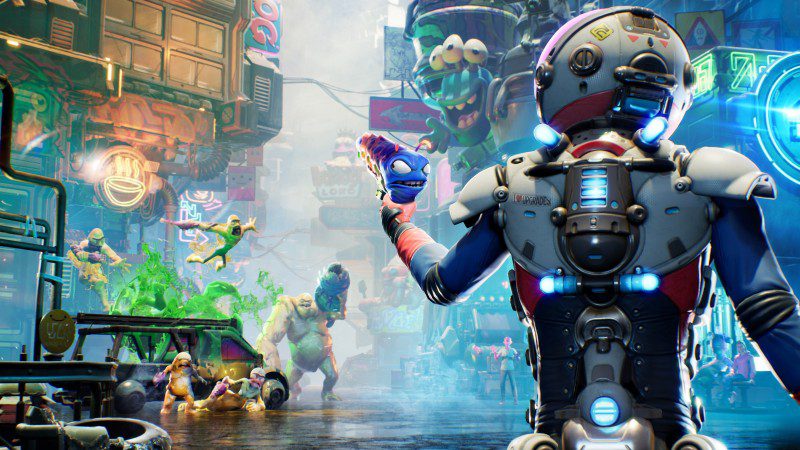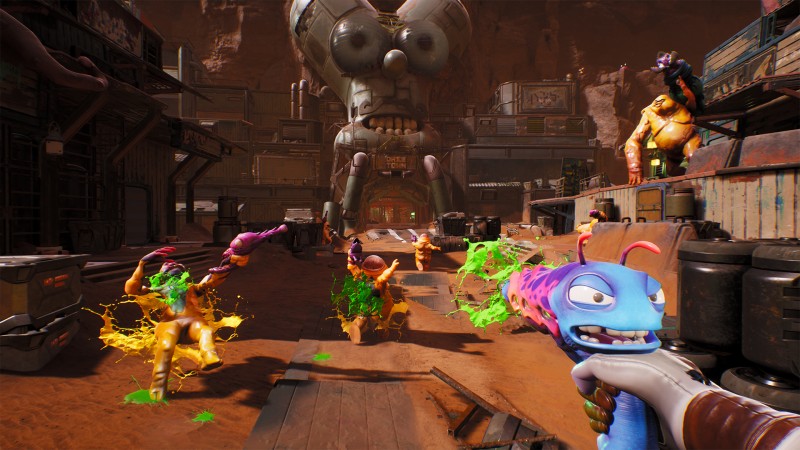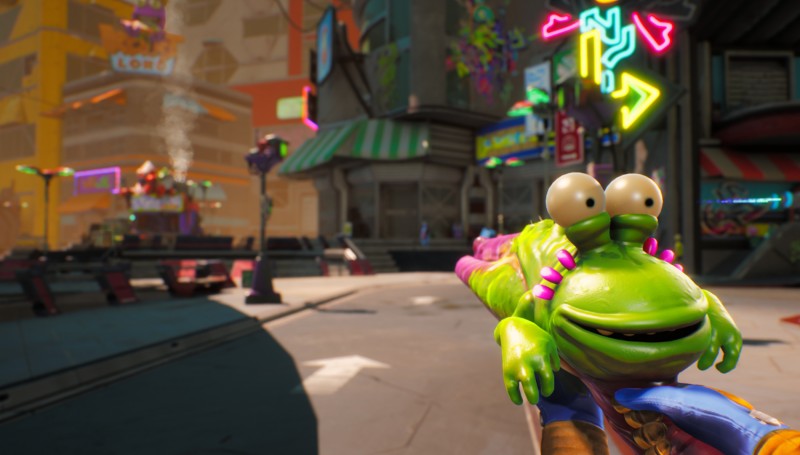Justin Roiland Almost Didn’t Voice The Main Gun In High On Life

High on Life, a game where you use talking guns to stop humans from being sold as drugs, is the newest title from Squanch Games, a development studio founded by Rick and Morty co-creator Justin Roiland, When I played their last game, Trover Saves the Universe, a few years ago, I was surprised by how naturally Roiland’s brand of improvised dialogue translated to video game form. Characters would ramble on as long as you stuck around to listen, and I would find myself standing in certain spots for upwards of five or six minutes, just listening to Roiland (who voiced many characters, Trover included) riff on one joke over and over again. While High on Life and Trover are two very different games, Roiland’s style of comedy is featured heavily in both. When I got a chance to talk to Roiland (and design director Erich Meyr), I was surprised to learn he originally wanted this game to have a different direction.
“I didn’t really want to do the main gun,” Roiland says. “I was trying to get out of it. But the team was like, ‘no, you have to do it.’”
Meyr interjects and echoes the team, “It’s kind of our signature at this point.”
Roiland ultimately agreed to it because the team pushed so hard. “I have to be wrong if everyone else is saying that,” he continues. “So I was like, alright, I’ll do it. And I knew that it would be helpful from a production standpoint for me to do it.”

The player fires Kenny, the gun voiced by Justin Roiland.
They explain that Roiland did so many voices in Trover Saves the Universe because it was originally temporary dialogue meant to be replaced later in the development cycle. The team ultimately decided to keep it in, both because it wasn’t worth the work to rerecord all of it and because they thought it was funny enough already.
“Trover was like 70% improv, 30% script, probably something like that,” Roiland said, unsure of the exact ratio. “This game is definitely the opposite. But there’s still fun improv.”
“Especially with the guns,” Meyr says. “A lot of the guns do improv.”
The guns in question are High on Life’s main narrative gimmick. As you explore the world, you find a series of talking guns with different personalities, each voiced by a different comedian. I asked Roiland about the casting process for such an odd set of roles, and he said they mostly knew who they wanted before even starting.
“JB Smoove was definitely someone I wanted from the get-go,” Roiland says. “Tim Robinson was another… our head writer Alec Robbins is friends with him. So he was just like, ‘hey do you want to do this?’ and [Robinson] is like, ‘yeah, I’ll do it’ without even really realizing what he was getting himself into.”

Gus, pictured here, is voiced by JB Smoove.
Meanwhile, Betsy Sodaro got the role through an audition, rounding out a cast that Roiland says is the same level of quality as a good animated comedy series. That said, the narrative design in a game like High on Life is far more complicated than the linear dialogue of an episode of Rick and Morty.
For example, a mechanic this game shares with Trover is “opt-in” dialogue. It’s what Squanch calls a scene where players can leave at any time, even when the other characters are still talking: the player is in charge of how much of the dialogue they want to experience, and NPCs respond to their behavior appropriately. Squanch Games’ work on Trover gave them an idea for the structure of those types of scenes and made the writing process smoother.
“You can stand near them, and they’re aware that you’re there, and then when you leave, they’re aware that you’re leaving,” Roiland says. “Writing all that stuff is just thinking about how the player could potentially interrupt or re-engage. If they do something, how does the NPC respond?”
An example of this in High on Life is in a section where the player meets a group of aliens called the Mac and Cheese Brothers. Typically, a player would approach, meet the brothers, and decide how to act. However, Meyr says, “When we were playtesting, we had someone who just from a distance shot a special ability and blew them all up before even meeting them. And we’re like, ‘okay, well, that’s a thing someone might do, right? Let’s write a line for that.”
As much work as they’ve done predicting player behavior, Roiland says he could see them going another year just adding more details. The project was so ambitious that they tripled the studio’s staff from about 20 to 60 to pull it off, and they still cut plenty of content.
“There’s tons of stuff,” Roiland says when I ask what didn’t make it in. “What’s interesting about those, though, is that sometimes you’ll come back to them… For sure on Rick and Morty there’s episodes in just about every season that were dreamt up in like season one or two that we have gone back [to] with fresh eyes… and then suddenly it clicks.”

Justin Roiland, founder of Squanch Games.
“It’s actually surprising how much we did get in,” Meyr says. “A lot of ideas are like kind of nuts.” He didn’t mention it here, but one of the most surprising things that did make it in were four full-length movies licensed to appear in the game and play on TVs in the background. The two developers didn’t want to list specific cut content in case it comes back one day, but I can’t help but wonder — if four full movies made the cut, what didn’t?
Today, the game is finally done and available to the general public. For Meyr, this is an exciting time.
“It’s great to see it so complete, you know,” Meyr says. “Because there’s so many cycles of focusing on what’s broken… and then in this last month, you kind of have to take your little dev goggles off and be like, ‘Oh that’s the game, right?’”
Meyr says his favorite thing to do after one of his games launches is to watch streamers play it. Before Twitch, they would have to wait for reviews and then maybe hear some people mention it online, but watching someone tackle it on launch day is “much more immediately gratifying, which is just really cool.”
After hearing about Meyr’s passionate love of launch day streamers, Roiland pauses for a moment, then says, “Yeah, I don’t do it.” When I ask why, he says, “I’ve lived it and seen it so much that like, I’m good. I’m good. I’m excited people are playing it… I just need some distance.” It’s not an opinion exclusive to games either — he feels that way about all of his creative projects. He and Meyr also agree that it takes them a few years after launch before they can properly enjoy a game they’ve worked on.
That doesn’t mean they’re not satisfied with this project, though. “I’m really proud of where we landed with this one,” Roiland says. “All the crazy ideas, it’s just insane. The team has been working insanely f—ing hard. It’s cool because we all have been living with this thing and believing in it for years and years.”
High on Life is out now on Xbox Series X/S, Xbox One, and PC and is available on Game Pass on those platforms. For more on the game, check out our rooftop interview from earlier this year.




